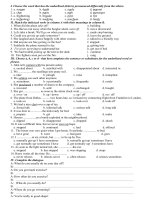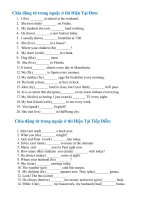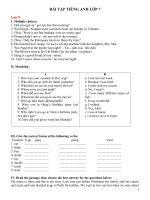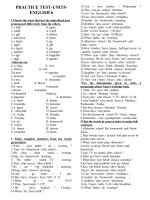BÀI TẬP LUYỆN TẬP UNIT 5 ENGLISH 11
Bạn đang xem bản rút gọn của tài liệu. Xem và tải ngay bản đầy đủ của tài liệu tại đây (137.6 KB, 5 trang )
A. MULTIPLE CHOICES:
I. Choose the word whose underlined part has a different pronunciation from the others in each group:
1. A. technology
B. different
C. mental
D. dentist
2. A. computer
B. from
C. bo x
D.doctor
3. A. happy
B. weekly
C. accuracy
D. multiply
4. A. produced
B. wanted
C. needed
D. subtracted
5. A. magazine
B. device
C. li ve
D. unit
6.A. teen
B. speed
C. ree nter
D. keep
7. A. of
B. often
C. f oreign
D. f ive
8. A. mu sic
B. computer
C. docu ment
D. illu strate
9. A. invention
B. option
C. calculation
D. question
10. A. a sk
B. a nswer
C. and
D.active
II. Choose the word whose main stress is placed differently from the others in each group:
1. A. technology
B. illustration
C. definition
D. electronic
2. A. computer
B. different
C. capable
D.calculate
3. A. number
B. software
C. manage
D. invent
4. A. become
B. hardware
C. letter
D. music
5. A. office
B. language
C. around
D. other
6.A. beauty
B. machine
C. daily
D. modern
7. A. newspaper
B. multiply
C. magical
D. allowance
8. A. magazine
B. collection
C. performer
D. invention
9. A. request
B. subtract
C. produce
D. action
10. A. device
B. lighting
C. magic
D. worry
III. Select the synonym of the following bold and underlined word in each sentence in the unit:
1. We visit shops, offices, and places of scenic beauty with the help of computers.
A. stay with
B. look at
C. stop over
D. come to see
2. We visit shops, offices, and places of scenic beauty with the help of computers.
A. houses
B. pubs
C. stores
D. inns
3. We read newspapers and magazines which have been produced on computers.
A. born
B. shaped
C. begun
D. manufactured
4. What makes computer a miraculous device?
A. strange
B. superhuman
C. wonderful
D. famous
5. Each time you turn it on, with appropriate hardware and software, it is capable of doing almost
anything you ask.
A. suitable
B. good
C. right
D. important
6. It is a calculating machine which speeds up calculations: it can add, subtract, multiply, and divide
with lightning speed and perfect accuracy.
A. full
B. total
C. capable
D. exact
7. It is a calculating machine which speeds up calculations: it can add, subtract, multiply, and divide
with lightning speed and perfect accuracy.
A. precision
B. goodness
C. loveliness
D. wonder
8. It is an electric store which manages large collections of data.
A. handles
B. works
C. drives
D. pilots
9. Decide which of the three options below is the best title for the passage.
A. voices
B. desires
C. choices
D. answers
10. Ask and answer questions about the uses of modern inventions.
A. up-to-date
B. new
C. late
D. present
IV. Select the antonym of the following bold and underlined word in each sentence in the unit:
1. Look at the illustrations of different parts of a computer system.
A. together
B. similar
C. average
D. pure
2. She was wearing a beautiful dress.
A. unsightly
B. dirty
C. dusty
D. bad
3. We receive letters from and send letters to almost every part of the world with the help of computers.
A. take
B. buy
C. sell
D. break
4. And we can even learn foreign languages on computers.
A. known
B. native
C. natural
D. expected
5. Each time you turn it on, with appropriate hardware and software, it is capable of doing almost anything
you ask.
A. unsuitable
B. unimportant
C. ill-prepared D. irregular
6. The man understood the lessons very well.
A. ill
B. hardly
C. poorly
D. wrong
7. Listen to the old man’s story again and write in the missing words.
A. existing
B. near
C. here
D. nearby
8. Places of scenic beauty are places where the scenes are interesting and beautiful.
A. incorrect
B. tiresome
C. irrelevant
D. unlucky
9. Why is computer a miraculous device?
A. ordinary
B. improper
C. false
D. ugly
10. My personal opinion is that the students should be doing more work outside the classroom.
A. national
B. inner
C. spiritual
D. public
B. USE OF ENGLISH:
I. Match the sentences, clauses or phrases in column A with the ones in column B to make meaningful
sentences:
A
B
1. You will be at the meeting soon,
A. isn’t it?
2. There is a lot of traffic,
B. won’t you?
3. Khanh will get better soon,
C. do they?
4. They won’t be late for school,
D. won’t he?
5. The girls don’t like tea,
E. will you?
6. He hasn’t got a laptop,
F. isn’t there?
7. You aren’t going out tonight,
G. are you?
8. It’s a striking villa,
H. has he?
9. Let’s go out for a walk,
I. will they?
10. Turn on the telly,
J. shall we?
II. Fill each gap with a suitable word from the list below:
emergency, pressed, central, capably, accuracy, magical, excuse, device, invention, multiply
1. Be careful what you believe - her powers of________ are well known.
2. The pilot of the aircraft was forced to make an________ landing on Lake Geneva.
3. In warm weather these germs________ rapidly.
4. The crowd________ against the locked doors trying to get into the building.
5. Rescuers used a special________ for finding people trapped in collapsed buildings.
6. No amount of financial recompense can_____ the way in which the company carried out its policy.
7. Of course, you pay more for premises with a________ location.
8. Diamonds were once thought to have________ powers.
9. We can predict changes with a surprising degree of _______.
10. She drove very _______.
III. Supply the correct form of the word in brackets:
1. Falling house prices are (illustrate)________ of the crisis facing the construction industry.
2. She started writing (poem)________ at a young age.
3. Well, you've made a (miracle)________ recovery since last night!
4. She is looking for a personal assistant with good (organize)________ skills.
5. We walked home arm-in-arm in the (magic)________ moonlight.
6. He is very (invent) _______, always dreaming up new gadgets for the home.
7. He gave me strict (instruct)________ to get there by eight o'clock.
8. You have to have such a lot of (patient)________ when you're dealing with kids.
9. The (graduate)________ are marked on the side of the container.
10. You say that a baby has a (health)________ pair of lungs when it cries loudly.
IV. Complete the following sentences with “yes, no, already, yet, just, once, often, recently, ago, before”:
1. A long time _______, there lived a girl called Cinderella.
2. If you'd say________ to the request you'd save a lot of trouble.
3. “Are you ready?” “Not________ - wait a moment.”
4. An opportunity as good as this arises________ in a lifetime.
5.________ we make a decision, does anyone want to say anything else?
6. How________ do you wash your hair?
7. As I have________ mentioned, I doubt that we will able to raise all the money we need.
8. “Would you like any more cake?” “_______, thank you.”
9. He'd________ got into the bath when the phone rang.
10. Until very________ he worked as a teacher and he still shudders at the memories.
V. Fill each gap with the correct form of the word in brackets.
1. Exercise has become part of my..........routine.
(day)
2. We wished her a........ recovery from her illness.
(speed)
3. We need to get an assistant who's........and efficient.
(capability)
4. The booklet should be very.........to parents of disabled children. (help)
5. The government is encouraging the.........of small businesses.
(develop)
6. Marie Curie is..........for her contribution to science.
(fame)
7. A...........illness is affecting all the animals.
(mystery)
8. Prevention also plays a...........role in traditional medicine.
(centre)
9. They had a.........escape when their car plunged into a river.
(miracle)
10. This….....enables computers to read handwriting.
(technical)
VI. Read the passage below carefully, and then decide whether the statements are true (T), false
(F) or not given (N):
The meanings of the terms science and technology have changed significantly from one
generation to another. More similarities than differences, however, can be found between the terms.
Both science and technology imply a thinking process, both are concerned with causal
relationships in the material world, and both employ an experimental methodology that results in
empirical demonstrations that can be verified by repetition. Science, at least in theory, is less concerned
with the practicality of its results and more concerned with the development of general laws, but in
practice science and technology are inextricably involved with each other. The varying interplay of the
two can be observed in the historical development of such practitioners as chemists, engineers, physicists,
astronomers, carpenters, potters, and many other specialists. Differing educational requirements, social
status, vocabulary, methodology, and types of rewards, as well as institutional objectives and
professional goals, contribute to such distinctions as can be made between the activities of scientists and
technologists; but throughout history the practitioners of “pure” science have made many practical as
well as theoretical contributions.
New vocabulary:
- practicality (n.): tính thực tế, tính thữc tiễn
- inextricable (adj.): không thể gỡ ra được; không thể giải quyết được (vấn đề,...)
- interplay (n.): ảnh hưởng lẫn nhau, sự tác động qua lại
- institutional (adj.): thuộc cơ quan, thuộc tổ chức
- practitioner (n.): thầy thuốc (luật sư) đang hành nghề
1. The meanings of the terms science and technology have stayed the same.
2. We can find more similarities than differences between the terms.
3. Only science implies a thinking process.
4. Technology employs a more experimental methodology than that of science.
5. Science, at least in theory, is more concerned with the development of general laws and less concerned
with the practicality of its results.
6. The changeable relationship of the two can be seen in the historical development of such practitioners
as chemists, engineers, physicists, astronomers, carpenters, potters, and many other specialists.
7. There are distinctions between the activities of scientists and technologists.
8. Institutional objectives and professional goals do not contribute to such distinctions.
9. Throughout history the practitioners of “pure” science have made a lot of
theoretical contributions.
10. The reading above is about science and technology.
practical as well as
VII. Read the following passage carefully, and then select the best option A, B, C or D to complete
it:
Technology, general term for the processes by (1)________ human beings fashion tools and machines to
increase (2)________ control and understanding of the material (3) _______. The term is derived from the
Greek words tekhnē, which refers to an art or craft, and logia, (4)________ an area of study; thus,
technology means, literally, the study, or science, of crafting.
Many historians of science argue not only that technology is an essential condition of advanced,
industrial civilization (5)________ also that the rate of technological change has developed its (6)________
momentum in recent centuries. Innovations now (7)________ to appear at a rate that increases
geometrically, (8)________ respect to geographical limits or political systems. These innovations tend to
transform traditional cultural (9) _______, frequently with unexpected social consequences. Thus
technology can be conceived as both a creative and a destructive (10) _______.
New vocabulary:
- to be derived from: có nguồn gốc từ
- momentum (n.): (thông tục) đà
- innovation (n.): sáng kiến, sự đổi mới
- geometrical (adj.): thuộc hình học
- geographical (adj.): thuộc địa lý
- to conceive (v.): nghĩ, hiểu; diễn đạt, bày tỏ
1.
A. that
B. which
C. whom
D. what
2.
A. the
B. its
C. their
D. his
3.
A. air
B. atmosphereC. surroundings
D. environment
4.
A. meaning B. saying
C. telling
D. reading
5.
A. and
B. but
C. or
D. so
6.
A. private
B. possessive
C. own
D. having
7.
A. like
B. want
C. love
D. seem
8.
A. for
B. by
C. with
D. without
9.
A. systems
B. networks
C. world
D. matters
10.
A. work
B. task
C. process
D. assignment
VIII. Complete the second sentences using the word given in brackets so that it has a similar
meaning to the first one:
1. The fire in the kitchen was discovered by a boy. (who)
→ It ______________________________________ the fire in the kitchen.
2. These girls are too young to get married. (old)
→ These girls __________________________________________ married.
3. “Do these toys interest you?” the dealer asked Oanh. (was)
→ The dealer asked Oanh _______________________________ those toys.
4. My sister really wishes she could dance well. (able)
→ My sister regrets not _____________________________________ well.
5. Trang said that I had broken the glass. (blamed)
→ Trang _____________________________________________ the glass.
6. Nhung did not need to register for the English course. (necessary)
→ It _________________________________________ the English course.
7. Her son never finishes his work on time although he works hard. (matter)
→ Her son never finishes ________________________________ he works.
8. There haven’t been many changes in this school since you last visited it. (much)
→ Since my last _________________________ has changed in this school.
9. Hardly did anybody apply for that job. (applicants)
→ There were very ______________________________________ that job.
10. Linh does a part-time job and takes care of her grandparents too. (well)
→ Linh does ___________________________________ her grandparents.









